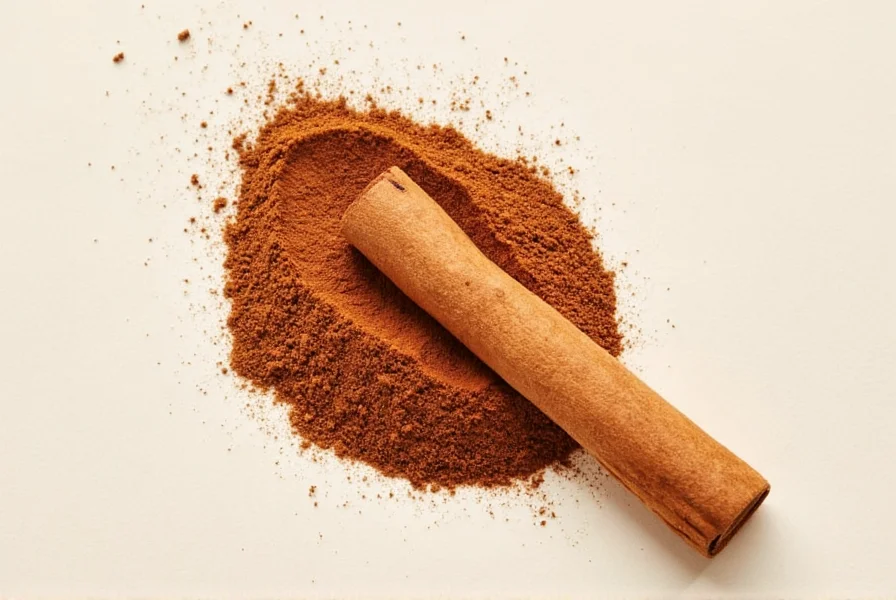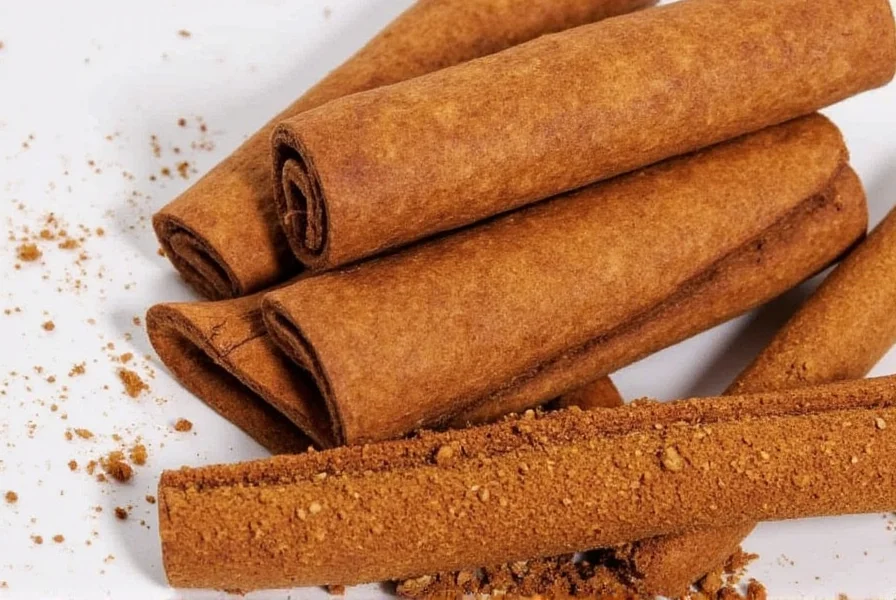One cinnamon stick equals ½ teaspoon of ground cinnamon. This precise conversion ratio is essential for recipe success, as using the wrong amount can dramatically alter flavor profiles. Ground cinnamon's finer particles expose more surface area to heat and air, making it 2-3 times more potent than whole sticks.

| Cinnamon Sticks | Ground Cinnamon Equivalent |
|---|---|
| 1 standard stick (2-3 inches) | ½ teaspoon |
| 2 sticks | 1 teaspoon |
| 3 sticks | 1½ teaspoons |
| 4 sticks | 2 teaspoons |
Cinnamon Stick vs. Ground Cinnamon: Understanding the Conversion Science
The reason this isn't a 1:1 substitution comes down to surface area and extraction efficiency. Cinnamon sticks release flavor compounds slowly through gradual infusion, while ground cinnamon's increased surface area delivers concentrated flavor immediately. Professional chefs confirm this ½ teaspoon ratio after extensive recipe testing across various cooking applications.
| Type | Flavor Release | Ideal Applications |
|---|---|---|
| Cinnamon Stick | Slow infusion (30+ minutes) | Liquid-based recipes: mulled wine, chai, stews, poaching liquids |
| Ground Cinnamon | Instant release | Baking, dry rubs, sprinkling, quick-cooking applications |
Advanced Cinnamon Conversion Guidance
Not all cinnamon sticks are created equal. When substituting, consider these professional adjustments:
Stick Length Variations
- Short sticks (under 2 inches): Use ¼ teaspoon ground cinnamon
- Standard sticks (2-3 inches): ½ teaspoon ground cinnamon
- Extra-long sticks (4+ inches): ¾ teaspoon ground cinnamon
Recipe-Specific Substitution Tips
- For baking: Add ground cinnamon to dry ingredients and reduce other liquids by 1-2 teaspoons to compensate for moisture absorption
- For beverages: Add ground cinnamon early in brewing to allow full flavor development
- For savory dishes: Bloom ground cinnamon in oil first to mellow its intensity
Proven Cinnamon Storage Methods for Maximum Potency
Preserve your cinnamon's flavor intensity with these chef-approved techniques:
- Store in airtight glass containers away from heat and light (pantry shelf, not above stove)
- Keep whole sticks for up to 4 years; ground cinnamon maintains peak quality for 2 years
- Freeze excess sticks in vacuum-sealed bags (thaw before use to prevent condensation)
- Test freshness by rubbing between fingers - potent cinnamon should produce immediate aromatic release
Culinary Applications: When to Use Each Form
Understanding which form works best can elevate your dishes:
Optimal Use of Cinnamon Sticks
- Infusing liquids for extended periods (mulled wine, chai, poaching syrups)
- Creating reusable flavor elements (stir sticks for coffee, decorative elements in beverages)
- Savory dishes requiring subtle background notes (Moroccan tagines, braised meats)
Optimal Use of Ground Cinnamon
- Baking applications (cookies, cakes, muffins)
- Dry spice blends and rubs
- Quick-cooking applications (oatmeal, smoothies, instant coffee)
- Sprinkling as finishing touch (doughnuts, fruit desserts)
Cinnamon Type Selection Guide
| Type | Conversion Ratio | Best Applications |
|---|---|---|
| Ceylon ("True" Cinnamon) | 1 stick = ½ tsp | Delicate desserts, beverages, recipes where subtle flavor is preferred |
| Cassia (Common Grocery Store) | 1 stick = ⅓ tsp (stronger flavor) | Baking, robust dishes, recipes needing pronounced cinnamon presence |
Common Conversion Mistakes to Avoid
Prevent recipe disasters with these professional insights:
- Mistake: Using 1:1 ratio
Solution: Always use ½ tsp ground per stick to avoid overpowering bitterness - Mistake: Adding ground cinnamon too late in cooking
Solution: For liquid recipes, add ground cinnamon at beginning to allow proper infusion - Mistake: Using old, stale cinnamon
Solution: Test potency before use; replace if aroma is weak after rubbing between fingers
Professional Cinnamon Measurement Technique
For absolute precision in critical recipes:
- Use a digital scale for ground cinnamon (½ tsp = approximately 1.2g)
- For sticks, measure length and adjust conversion ratio proportionally
- When in doubt, start with slightly less ground cinnamon and adjust to taste

FAQ: Quick Reference Guide
How much ground cinnamon equals one cinnamon stick?
One standard cinnamon stick (2-3 inches) equals exactly ½ teaspoon of ground cinnamon. This conversion accounts for ground cinnamon's higher surface area and more potent flavor release.
Can I substitute ground cinnamon for a cinnamon stick in baking recipes?
Yes, use ½ teaspoon ground cinnamon per stick. For baked goods, add it directly to dry ingredients. For liquid-based recipes, add ground cinnamon early to allow full flavor infusion.
Why isn't the substitution a 1:1 ratio?
Ground cinnamon's fine particles expose more surface area to heat and air, making it 2-3 times more potent than whole sticks. Equal volumes would create overpowering, bitter flavors.
How do I substitute for specific stick lengths?
Adjust based on stick length: under 2 inches = ¼ tsp, standard 2-3 inch = ½ tsp, extra-long (4+ inches) = ¾ tsp.
Does cinnamon type affect the conversion?
Yes. Cassia (common grocery store cinnamon) is stronger - use ⅓ tsp ground per stick. Ceylon ("true" cinnamon) follows the standard ½ tsp ratio.










 浙公网安备
33010002000092号
浙公网安备
33010002000092号 浙B2-20120091-4
浙B2-20120091-4